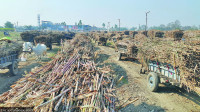Money
Outsourced delivery services take off as e-commerce flourishes in urban areas
PickNDrop has been selected among the top five in the start-up category for this year’s ICT Awards.
Pawan Pandey
When cooking gas deliveries in Kathmandu Valley were disrupted due to the Covid-19 lockdown in 2020, a group of young entrepreneurs stepped in to keep the kitchen fires burning.
Nepal slapped a nationwide stay-home order in March 2020 in a bid to prevent the spread of the coronavirus, and people were marooned in their houses with no supplies.
Entrepreneurs Sishir Khanal, Ghanshyam Khanal and Nabin Parajuli had founded PickNDrop in April 2020 as a delivery service for e-commerce businesses. When the pandemic struck, the firm was kept busy transporting gas cylinders house to house for nearly a year.
Sishir Khanal, who is also the co-founder of Teach for Nepal, a social enterprise that works to improve the quality of public school education, was elected to the House of Representatives on a Rastriya Swatantra Party ticket from Kathmandu-6.
Ghanshyam Khanal, a computer science and information technology graduate, and Parajuli, a computer engineer, had worked together for a software development company in 2011. They knew Sishir from their participation in Teach for Nepal events and programmes.
The former colleagues were familiar with the need for reliable third-party delivery services from their previous endeavours. Parajuli had started a platform to sell tech-related products in 2014.
“Our discussions with e-commerce entrepreneurs prior to the launch of PickNDrop only confirmed our belief regarding their need for a reliable logistics and delivery service,” said Parajuli.
With the pandemic at its height, it was challenging for PickNDrop to provide services and find clients, say the co-founders.
Business started picking up after a year following the relaxation of Covid restrictions. The firm then reoriented its services to its original objective—a third-party business-to-business delivery service provider.
According to Parajuli, they have more than 400 clients including Daraz, SastoDeal and Gyapu. “Over 400 clients have registered with us, and we get calls from around 60 clients daily.”
PickNDrop has been selected among the top five in the start-up category for this year’s ICT Awards which will be held on December 23 in Kathmandu.
The company began with an investment of Rs3.5 million which, according to Parajuli, they put together from family and friends. “The investment has now crossed Rs25 million,” said Parajuli. “We are still raising capital for the next round of investment.”
PickNDrop has 22 delivery associates in the valley and another 10 in major cities across the country.
The company outsources deliveries in rural and remote areas to individuals or joins forces with other courier companies.
A delivery associate, or the person who goes out to make deliveries, needs to have their own vehicle and driving licence. The company pays for the gasoline, communication and maintenance, according to Parajuli. “Delivery individuals are also provided with insurance coverage.”
The starting salary for a delivery associate is Rs18,000 per month, and the company provides incentives on the basis of deliveries.
Mandip Nepal, a delivery associate from Jhapa district in the eastern Tarai, says he makes Rs22,000 a month, excluding incentives. Nepal has been with PickNDrop for two years.
“A bonus is paid for making more than 15 deliveries in a day,” said Parajuli. “A delivery associate can earn between Rs18,000 and Rs30,000 a month.”
Besides making deliveries, PickNDrop also collects payments for their clients.
“We launched the ‘next day payment settlement’ scheme to give suppliers their money on the day following delivery after discovering that delays in payment were a major issue for many e-commerce businesses.”
PickNDrop generally charges Rs110 including value added tax for delivering a package weighing up to 1 kg within the valley. The charge increases by Rs20 for each additional kilo.
Elsewhere in the country, the firm charges Rs120 for a 500 gm package, and Rs150 for a package weighing up to 1 kg. For large clients, they have a bulk rate.
The company also provides customised service including packaging services for various clients.
Despite the huge scope of e-commerce, the co-founders feel the government has neglected the sector in its plans and policies.
“Besides the hurdles in registering a company, we lack funding to expand our business,” said Parajuli. “The government should not only make plans on paper, it should execute them in reality as well.”
Though the government promises to provide seed capital to start-ups to promote youth entrepreneurship and innovation, a work procedure needed to make this happen is yet to see the light of day.
"The hesitation of Nepali companies to insure individual packages has made it difficult for long-distance delivery of expensive items," said Parajuli.
Another problem that makes life difficult for PickNDrop is lack of proper addresses. Delivery associates and clients have a hard time finding each other when making a delivery because of the bewildering addressing system.
“There is also a shortage of technical human resources to operate a delivery tracking system, check the delivery status and prepare reports,” said Parajuli.




 12.58°C Kathmandu
12.58°C Kathmandu













